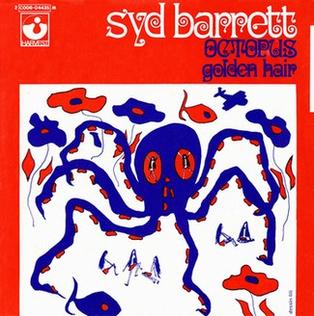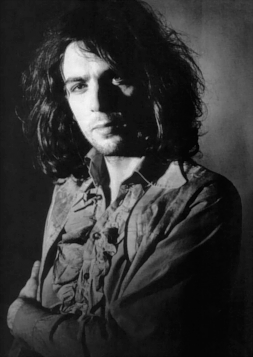Related Research Articles
Jokers Wild were a British rock band formed in Cambridge, England, in 1964. The group were active until 1967, and are best known for launching the career of guitarist David Gilmour, who went on to join Pink Floyd.

Opel is a 1988 album compiled from recordings made by former Pink Floyd frontman Syd Barrett between 1968 and 1970. The album is a compilation of unreleased material and alternative takes of recordings from sessions for Barrett's solo albums, The Madcap Laughs and Barrett.

The Madcap Laughs is the debut solo album by the English singer-songwriter Syd Barrett. It was recorded after Barrett had left Pink Floyd in April 1968. The album had a lengthy recording history, with work beginning in May 1968, but the bulk of the sessions taking place between April and July 1969, for which five different producers were credited − including Barrett, Peter Jenner, Malcolm Jones, and fellow Pink Floyd members David Gilmour and Roger Waters. Among the guest musicians are Willie Wilson from Gilmour's old band Jokers Wild and several members of Soft Machine.

Barrett is the second and final studio album of new material released by former Pink Floyd frontman Syd Barrett. Recording began at Abbey Road Studios on 26 February 1970, and lasted for 15 sessions until 21 July. The album was produced by Pink Floyd's David Gilmour and Richard Wright, who also contributed on bass and keyboards respectively, along with previous Madcap contributor Jerry Shirley on drums.

Crazy Diamond is a 1993 triple-CD boxed set of Syd Barrett's two 1970 albums The Madcap Laughs and Barrett, and Opel, an out-takes compilation from 1988. All discs are further augmented by various alternate takes.
"Our main plan was to find Syd's acoustic takes, before the other musicians were drafted in to overdub them. But we stumbled across some fascinating material that sheds new light on Syd's working methods." — Phil Smee

The Best of Syd Barrett: Wouldn't You Miss Me? is a compilation album by Syd Barrett released in 2001 that spans Barrett's entire solo career. It was released on 16 April 2001 in the UK and 11 September 2001 in the US.

"Octopus" is a song by Syd Barrett. In January 1970 it appeared on his first solo album The Madcap Laughs.
"Remember a Day" is a song by the English rock band Pink Floyd, written and sung by their keyboardist Richard Wright, appearing on their second album, A Saucerful of Secrets (1968). It was performed by Pink Floyd only once, as an encore in May 1968; it was subsequently performed by David Gilmour in September 2008 in memory of Wright, who had recently died of cancer, on Later... with Jools Holland, and by Nick Mason during his Saucerful of Secrets tour. The dreamy, poetic lyrics are about nostalgia for the lost paradise of early childhood.

"Arnold Layne" is a song by English rock band Pink Floyd. Released on 10 March 1967, it was the band's first single and was written by Syd Barrett.

Roger Keith "Syd" Barrett was an English singer, guitarist and songwriter who co-founded the rock band Pink Floyd in 1965. Until his departure in 1968, he was Pink Floyd's frontman and primary songwriter, known for his whimsical style of psychedelia, English-accented singing, and stream-of-consciousness writing style. As a guitarist, he was influential for his free-form playing and for employing effects such as dissonance, distortion, echo and feedback.
"Dark Globe" is a song by Syd Barrett, released on his first solo album The Madcap Laughs.

The Radio One Sessions is a live album by former Pink Floyd vocalist and guitarist, Syd Barrett. It is the last Barrett album released in his lifetime before his death in 2006.
"Vegetable Man" is a song by the English rock band Pink Floyd, written by the frontman, Syd Barrett, and recorded in 1967. It was considered for a release as a single or for inclusion on their second album, A Saucerful of Secrets, but went unreleased. Bootlegged for decades, the song did not have an official release until 2016, when it was included on the box set The Early Years 1965–1972.

The Pink Floyd and Syd Barrett Story is a 2001 television documentary produced by Otmoor Productions for BBC Two's Omnibus series and originally called Syd Barrett: Crazy Diamond. Directed by John Edginton, the film includes interviews with all the Pink Floyd members – Roger Waters, David Gilmour, Nick Mason and Richard Wright – plus the "fifth Pink Floyd", Bob Klose, who left the band in 1965, getting their points of view on the original band founder Syd Barrett. The film includes rare early television appearances of Pink Floyd, and home movies.
"Scream Thy Last Scream" is a song by Pink Floyd, written by frontman Syd Barrett and scheduled to be the band's next single after "See Emily Play".
"Terrapin" is the opening song on Syd Barrett's first solo album The Madcap Laughs. Its arrangement is sparse, like much of the album, and features only acoustic and electric guitar accompaniment to the vocals. This song, along with "Maisie" and "Bob Dylan Blues"; reflected Barrett's early interest in the blues. Iggy the Eskimo, one of Barrett's acquaintances, had called the song "quite catchy".
"Bob Dylan Blues" is a song written in 1965 by Syd Barrett, the founder of Pink Floyd. Recorded during sessions for Barrett, it was unreleased until it turned up in 2001. The song was included in The Best of Syd Barrett.

An Introduction to Syd Barrett is a 'best of' compilation featuring the work of Syd Barrett spanning the period 1967–1970, including both material written during his time with Pink Floyd and his post-band solo career.
Willie Wilson is an English rock drummer, known for his work with Pink Floyd and his long-time association with their guitarist, David Gilmour.
References
- ↑ https://www.thisisdig.com/feature/syd-barrett-pink-floyd-founder-life-legacy/ [ bare URL ]
- ↑ "Chris Joe Beard – The Purple Gang – The Strange Brew". The Strange Brew. 2020. Retrieved 7 January 2024.
- 1 2 3 4 Jones, Malcolm (2003). The Making of The Madcap Laughs (21st Anniversary ed.). Brain Damage. p. 8.
- 1 2 Jones, Malcolm (2003). The Making of The Madcap Laughs (21st Anniversary ed.). Brain Damage. p. 7.
- ↑ Manning, Toby (2006). "Set the Controls". The Rough Guide to Pink Floyd (1st ed.). London: Rough Guides. p. 71. ISBN 1-84353-575-0.
- ↑ "Pink Floyd news :: Brain Damage - 'An Introduction to Syd Barrett' coming from EMI/Harvest in October". Brain Damage. 12 August 2010. Retrieved 9 August 2012.